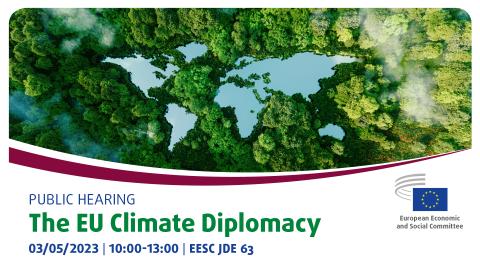European Economic
and Social Committee
Climate diplomacy can also be used to shape our external relations
The European Economic and Social Committee (EESC) held a public hearing to deliver suggestions on how to make EU climate diplomacy more effective. The participants discussed whether the EU should reconsider its approach towards climate diplomacy and identified ways to facilitate climate action and better coordination of related policies at all levels (European, national, regional and local).
On 3 May 2023, the EESC's External Relations Section organised a public hearing bringing together experts to discuss how climate diplomacy can factor into external action policy. The participants also highlighted the need to integrate climate objectives and address climate risks at the highest diplomatic level across all policy areas.
The output will feed into an own-initiative opinion on EU Climate Diplomacy to be drawn up in the coming months. It builds on the EESC's previous work exploring the practical aspects of this topic.
The participants sought to define climate diplomacy from various perspectives. Agnes Fälldin focal point for Climate Diplomacy and Climate & Security at the Permanent Representation of Sweden to the EU, said that "climate diplomacy includes all actions that we carry out with regard to third parties outside the European Union, and so the Fit for 55 package is not part of our climate diplomacy".
However, Ms Fälldin acknowledged that the green transition brings with it a host of opportunities for growth and job creation which can only be achieved if we team up with the private sector and civil society actors inside and outside the EU
.
This view was shared by Laura Martínez Bocos, Counsellor at the Permanent Representation of Spain to the EU. She said that the Council of the European Union defined EU climate and energy diplomacy as a core component of EU foreign policy, stressing the EU's determination to engage and work with partners worldwide to implement the Paris Agreement.
Mario Morettini from the Green Transition Unit of the European External Action Service (EEAS) stressed that climate diplomacy has been evolving as a concept: it is not only about climate but also about Green Deal-related issues, with an essential role played by civil society. I think that it is very important to make sure that when pursuing our overall global climate ambitions, we cooperate and partner up with third countries
.
The president of the EESC's Employers Group and rapporteur for the opinion, Stefano Mallia, argued that climate diplomacy should not be restricted just to a country-to-country approach, but rather should allow for the dynamics within a country, between stakeholders and trade partners as well as in civil society both inside and outside the EU.
Professor Emmanuella Doussis from the Kapodistrian University of Athens in Greece, pointed out that there is no agreed definition of what climate diplomacy is. It is a form of targeted policy that refers to the use of diplomatic tools to support the achievement of the international climate goals reducing the negative impacts of climate change on peace, stability and prosperity. In other words, climate diplomacy aims to prioritize to mainstream
.
Therefore, the key questions are how to build better climate diplomacy networks by involving non-state actors and how to build bridges across and within different sectors.
Taking the floor, Mats Engström, senior policy fellow at the European Council on Foreign Relations, stressed the importance of cooperating with different partner countries. He said that this should be done faster and more efficiently to narrow the trust gap which has emerged between the European Union and developing countries.
Daria Ivleva, senior advisor and co-lead on climate action at Adelphi, described climate diplomacy as a tool or a policy field and said that it is a way to interpret diplomacy in a changing and climate-vulnerable world.
Consequently, the EU should establish international interaction and communication to accelerate change and reduce transition risks, in order to stay safe and secure.
Dr Jamie Shea, former NATO Deputy Secretary-General for Emerging Security Challenges and current Secretary-General of the Global Military Advisory Council on Climate Change, pointed out that the major challenge will be to convince the NATO community that you can work on defence and on reducing carbon emissions, to make it clear that you can have an effective defence policy that is also greener
.
During his statement, Dr Shea showed that the EU can put in place a climate diplomacy strategy which will also ensure its security. He used the war in Ukraine to demonstrate the environmental impact and a series of implications for energy security.
Given that climate itself is generally not a direct cause of conflict but a significant stress factor, working with various partners is important for conflict prevention.
Additionally, forging partnerships and networks is important as they can build trust and development through capacity-building within civil society.
Agata Meysner, president of Generation Climate Europe, brought the youth perspective to the discussion, emphasising that the climate crisis cannot be solved in meeting rooms. We need multi-stakeholder collaboration, including civil society
.
In order to leverage climate diplomacy and the EU's leading role, Ms Meysner proposed that science should be at the heart of climate diplomacy, together with intergenerational justice and inclusive participation of civil society.
Concluding the hearing, the Employers Group president and rapporteur, Stefano Mallia asked whether the EU was indeed championing the global fight against climate change. Perhaps in regulations or standards, but probably not in technology nor in production capacity. Do we have all the tools we need, including technology and finance, to make our climate policy successful? Properly targeted climate diplomacy, enriched by a strategic approach could be a game changer. To negotiate for the climate, we need to prepare the climate for negotiations
.
Work organisation
Downloads
-
Climate diplomacy can also be used to shape our external relations
